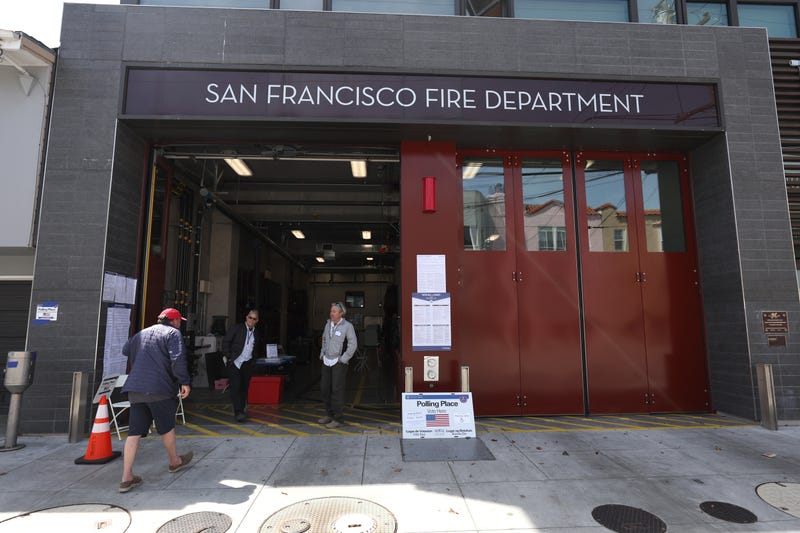
SAN FRANCISCO (KCBS RADIO) – A measure to hold major San Francisco elections during presidential years, which Mayor London Breed labeled a democratic socialist power grab in a KCBS Radio interview last week, is headed to the ballot this fall.
For more, stream KCBS Radio now.
The San Francisco Board of Supervisors on Tuesday voted 7-4 for San Franciscans to decide in the November election if the city will vote for mayor, sheriff, district attorney, city attorney and treasurer in 2024 – rather than 2023, as currently scheduled – and every four years after that.
Proponents of the measure, which Supervisors Dean Preston and Aaron Peskin co-sponsored, have pointed to San Francisco's participation disparities in even- and odd-year elections, which they say are especially stark among poorer voters and communities of color.
Breed, whose current term would extend to five years if the proposal passes, blasted the measure – authored by Preston, the first democratic socialist elected to the board in decades – during a July 11 interview with KCBS Radio.
"You're talking about one supervisor, who decided with a group of democratic socialists that they wanna change elections in San Francisco in order to have more control and power of being able to get more of their people elected," Breed claimed. "I don’t think that's the right way to do things. No members of the public have had any say in how we shape this policy and what it all means."
The Democratic Socialists of America's San Francisco chapter told KCBS Radio in a statement last week that the group "had no role in directly crafting" the measure. Nationally, the DSA said last year it had about 95,000 members.
Asked how the forthcoming ballot measure would give San Francisco democratic socialists "more control and power," a spokesperson from Breed's office didn't answer. The spokesperson told KCBS Radio in an emailed statement on Wednesday afternoon that the mayor would've supported a similar measure following "extensive public processes," as was the case when Los Angeles and San Jose implemented similar election year changes.
"This measure is being placed on the ballot, including extending the current terms of several elected officials, without any public process to understand the goals and impacts of that change," the spokesperson said, pointing to a letter Breed wrote to Peskin last month.
San Francisco's citywide electoral participation has lagged behind statewide and national elections. Preston presentation to the board on Tuesday said San Francisco averaged 80% turnout during even-year November elections between 2011 and 2020, compared to 43% in odd years.
Among the 54 California cities that switched from odd-year to even-year municipal elections last decade, the voter advocacy group Common Cause found in a report last year that, on average, turnout increased from 25.5% to 75.8%.
"Although we don't always agree on everything, I think it's important when democracy is at stake to come together," Supervisor Ahsha Safai said to Preston in support of the measure. "And make no mistake about it, democracy is absolutely under attack in this country. And if we purport to be leaders in that conversation for the rest of the nation, if we want our San Francisco values to be exported, this is one of them."
Some supervisors, including some who voted in support of the measure, expressed reservations about what holding elections every two years would mean for the city's forthcoming bond schedule and with planning for the next citywide election already underway, while also expressing support for ways to increase voter turnout.
Board President Shamann Walton said he would campaign for the measure this fall, but he voted against it because it didn't make an allowance for current elected officials. Supervisor Rafael Mandelman said he "reluctantly" voted against the measure because he was "uncomfortable with getting rid of the election next year," expressing support for holding citywide elections during non-presidential even years.
Gordon Mar pointed to the bond schedule, while Matt Dorsey – Breed's appointee to fill Matt Haney's vacant District 6 seat when he was elected to the California State Assembly this spring – said he applauded "the rationale that underpins this charter amendment" but voted against the measure due to "a number of philosophical issues with it" as written.
"I'm generally uncomfortable with San Francisco having to go a period of two years without hearing from voters," Dorsey said. "I think that would be, at least in my experience in this city, an unprecedented amount of time to not hear from voters."
While Myrna Melgar admitted the measure poses a "political problem" for future bonds and candidates campaigning ahead of 2023, she and Hillary Ronen expressed support for the charter amendment as an opportunity to keep young voters engaged in citywide elections.
"This feels to me a little bit like ripping a band-aid because we have been planning on bonds, we have been planning on doing these things in 2023," Melgar said. "But ultimately, I think that this is a good thing to do for our city. I think it's consistent with what the evidence shows."
DOWNLOAD the Audacy App
SIGN UP and follow KCBS Radio
Facebook | Twitter | Instagram

